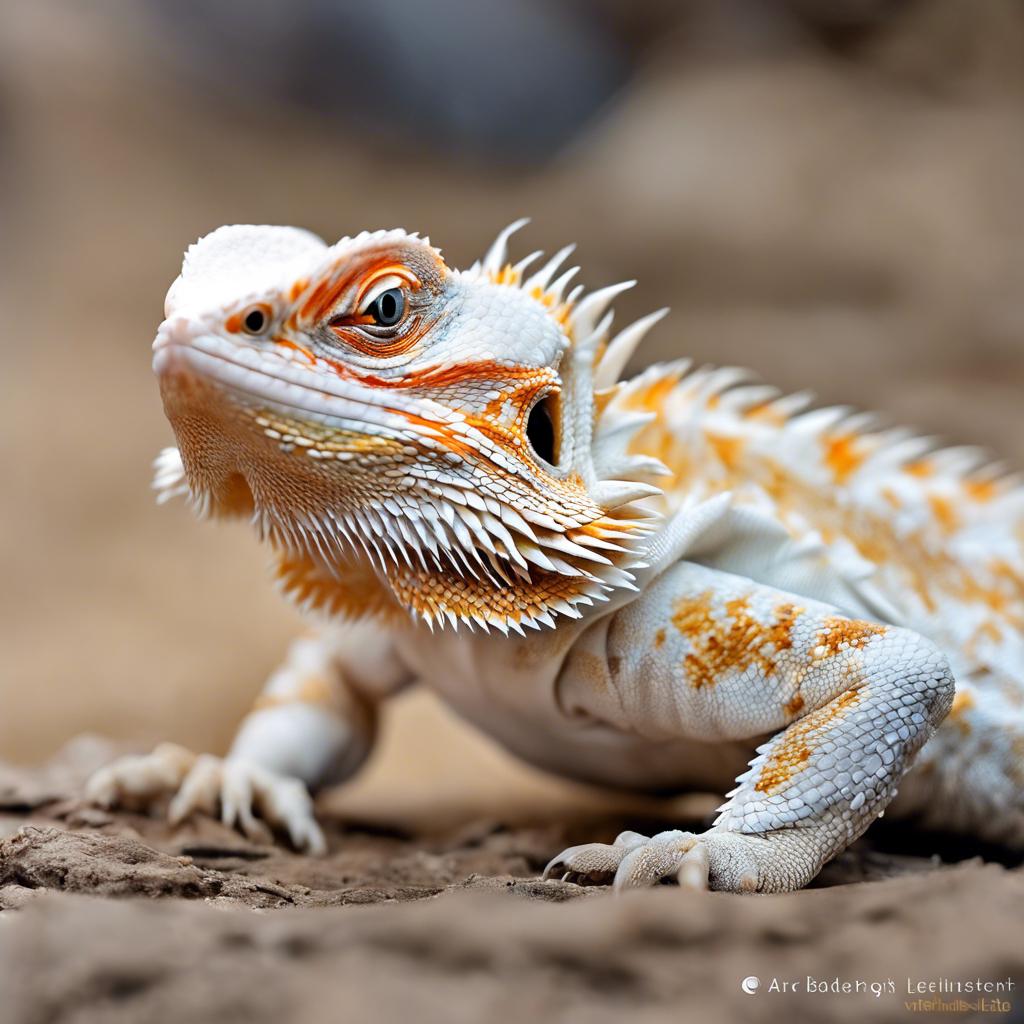Bearded dragons are popular reptile pets known for their unique appearance and docile nature. These fascinating creatures are native to Australia and have become increasingly popular as pets around the world. As responsible pet owners, it is crucial to understand the importance of maintaining the health of our bearded dragons.
The health of a bearded dragon is vital for its overall well-being and longevity. Just like any other living creature, they are susceptible to various health issues that can affect their quality of life. By being aware of common health problems and taking proactive measures, we can ensure that our bearded dragons live happy and healthy lives.
Key Takeaways
- Bearded dragons are popular pets that require proper care to maintain their health.
- Common health issues in bearded dragons include metabolic bone disease, respiratory infections, and parasites.
- A bearded dragon's head turning white can be a sign of stress, shedding, or a fungal infection.
- Signs and symptoms of bearded dragon health issues include lethargy, loss of appetite, and abnormal behavior.
- Proper diagnosis and treatment of bearded dragon health issues require a visit to a reptile veterinarian and may include medication, dietary changes, and environmental adjustments.
Common Health Issues in Bearded Dragons
Bearded dragons, like any other pet, can experience a range of health issues throughout their lives. Some of the most common health problems in bearded dragons include metabolic bone disease, respiratory infections, parasites, and impaction. These issues can arise due to improper diet, inadequate lighting or heating, poor hygiene, or unsuitable living conditions.
Early detection and treatment are crucial when it comes to addressing these health issues. Regular veterinary check-ups and monitoring your pet's behavior can help identify any potential problems before they become severe. By being proactive in maintaining your bearded dragon's health, you can prevent complications and ensure a longer and happier life for your pet.
What Causes Bearded Dragon Head Turning White?
One common issue that bearded dragon owners may encounter is their pet's head turning white. This can be a cause for concern, as it may indicate an underlying health problem. The most common cause of a bearded dragon's head turning white is shedding. Bearded dragons shed their skin periodically as they grow, and during this process, their skin may appear pale or white.
Another possible cause of a white head in bearded dragons is stress or fear. When a bearded dragon feels threatened or anxious, it may display defensive behaviors such as puffing up its beard and turning its head white. This is a natural response to perceived danger and is usually temporary.
It is important to address any issues with a bearded dragon's head turning white promptly. If the white color persists for an extended period or is accompanied by other concerning symptoms, it is advisable to consult a veterinarian for a proper diagnosis and treatment.
Signs and Symptoms of Bearded Dragon Head Turning White
When a bearded dragon's head turns white, it is essential to observe any accompanying signs and symptoms that may indicate an underlying health issue. Some common signs to look out for include loss of appetite, lethargy, weight loss, abnormal bowel movements, respiratory distress, or changes in behavior.
If your bearded dragon displays any of these symptoms along with a white head, it is crucial to seek veterinary attention immediately. These signs may indicate a more serious health problem that requires professional intervention.
Regular monitoring of your pet's behavior and overall well-being is essential in maintaining their health. By being attentive to any changes or abnormalities, you can catch potential health issues early on and seek appropriate treatment.
Diagnosing Bearded Dragon Health Issues
When it comes to diagnosing health issues in bearded dragons, it is best to consult a veterinarian who specializes in reptile care. These professionals have the knowledge and experience to properly diagnose and treat various health problems that may arise in bearded dragons.
During a veterinary examination, the veterinarian will conduct a thorough physical examination of your bearded dragon. They may also request additional tests such as blood work, fecal analysis, or X-rays to get a comprehensive understanding of your pet's health.
It is important not to attempt self-diagnosis or treatment without professional guidance. Bearded dragons have unique physiological needs and require specialized care. Seeking professional help ensures that your pet receives the appropriate treatment and care for their specific health issue.
Treatment Options for Bearded Dragon Head Turning White

The treatment options for a bearded dragon with a white head will depend on the underlying cause. If the white color is due to shedding, it is generally a natural process that does not require intervention. However, providing a suitable environment with proper humidity and temperature can help facilitate the shedding process.
If the white head is a result of stress or fear, it is essential to identify and address the source of the anxiety. Creating a calm and secure environment for your bearded dragon can help alleviate stress and prevent further issues.
In cases where the white head is accompanied by other concerning symptoms, such as loss of appetite or respiratory distress, veterinary intervention is necessary. The veterinarian may prescribe medications, recommend dietary changes, or provide other treatments based on the specific diagnosis.
It is crucial to follow the veterinarian's instructions carefully and administer any prescribed medications as directed. Proper treatment and care are essential in ensuring your bearded dragon's recovery and overall well-being.
Bearded Dragon Care: Tips for Keeping Your Pet Healthy
Maintaining the health of your bearded dragon requires proper care and attention. Here are some tips to help you keep your pet healthy:
1. Provide a suitable habitat: Bearded dragons require a spacious enclosure with appropriate lighting, heating, and humidity levels. Ensure that their habitat mimics their natural environment as closely as possible.
2. Maintain proper hygiene: Regularly clean and disinfect your bearded dragon's enclosure to prevent the buildup of bacteria or parasites. Also, ensure that their food and water dishes are clean and free from contamination.
3. Monitor temperature and lighting: Bearded dragons require specific temperature gradients and UVB lighting to thrive. Regularly check and maintain these conditions to ensure optimal health.
4. Offer a balanced diet: Bearded dragons are omnivores and require a varied diet consisting of insects, vegetables, and fruits. Consult a veterinarian or reptile nutritionist to ensure that you are providing the right balance of nutrients for your pet.
5. Provide fresh water: Bearded dragons require access to clean, fresh water at all times. Ensure that their water dish is cleaned and refilled regularly.
6. Handle with care: When handling your bearded dragon, be gentle and avoid any sudden movements or rough handling. This will help prevent stress or injury to your pet.
Feeding and Nutrition for Bearded Dragons
Proper feeding and nutrition are crucial for the health and well-being of bearded dragons. These reptiles require a balanced diet that consists of both animal protein and plant matter.
The primary source of protein for bearded dragons is insects such as crickets, mealworms, and dubia roaches. These should be dusted with a calcium supplement before feeding to ensure that your pet receives adequate calcium for bone health.
In addition to insects, bearded dragons should also be offered a variety of vegetables and fruits. Leafy greens such as collard greens, kale, and dandelion greens are excellent choices. Fruits such as berries, melons, and apples can be offered in moderation as treats.
It is important to provide a varied diet to ensure that your bearded dragon receives all the necessary nutrients. Consult a veterinarian or reptile nutritionist for specific dietary recommendations based on your pet's age, size, and overall health.
Environmental Factors that Affect Bearded Dragon Health
The environment in which a bearded dragon lives plays a significant role in its overall health and well-being. Here are some environmental factors to consider:
1. Temperature: Bearded dragons require a temperature gradient in their enclosure to regulate their body temperature effectively. Provide a basking spot with a temperature of around 95-105°F (35-40°C) and a cooler area with a temperature of around 75-85°F (24-29°C).
2. Lighting: Bearded dragons require UVB lighting to synthesize vitamin D3, which is essential for calcium absorption. Ensure that your pet's enclosure has a UVB light source that is replaced regularly according to the manufacturer's instructions.
3. Humidity: Bearded dragons require a moderate level of humidity in their enclosure. Too high humidity can lead to respiratory issues, while too low humidity can cause shedding problems. Aim for a humidity level of around 30-40%.
4. Substrate: The substrate in your bearded dragon's enclosure should be safe and easy to clean. Avoid substrates that can cause impaction, such as loose sand or small particles that can be ingested.
By creating a suitable habitat for your bearded dragon and maintaining optimal environmental conditions, you can help prevent health issues and ensure their well-being.
Taking Care of Your Bearded Dragon's Health
In conclusion, maintaining the health of your bearded dragon is crucial for their overall well-being and longevity. By understanding common health issues, monitoring your pet's behavior, and seeking professional help when needed, you can ensure that your bearded dragon receives the appropriate care and treatment.
Proper care and attention, including providing a suitable habitat, maintaining hygiene, offering a balanced diet, and creating optimal environmental conditions, are essential in keeping your bearded dragon healthy.
Remember, being a responsible pet owner means prioritizing your bearded dragon's health and well-being. By following these guidelines and seeking professional advice when necessary, you can provide the best possible care for your beloved pet.
If you're a bearded dragon owner and have noticed your pet's head turning white, you may be wondering what could be causing this change in color. In a recent article on Reptile Wizard's blog, they explore the possible reasons behind a bearded dragon's head turning white and provide helpful insights on how to address this issue. From discussing potential health concerns to offering tips on proper care and diet, this article is a must-read for any concerned bearded dragon owner. To learn more about this topic, check out the article here. Additionally, if you're interested in learning about what foods are safe for your bearded dragon, you can also read their article on whether bearded dragons can eat black olives here. Another interesting read is their article on why some bearded dragons have an orange coloration around their eyes here.
FAQs
What is a bearded dragon?
A bearded dragon is a type of lizard that is native to Australia. They are popular pets due to their docile nature and ease of care.
Why is my bearded dragon's head turning white?
There are several reasons why a bearded dragon's head may turn white, including shedding, stress, illness, or a lack of proper nutrition.
Is it normal for a bearded dragon to shed?
Yes, shedding is a normal process for bearded dragons. They shed their skin as they grow, and this can cause their head to turn white temporarily.
How can I reduce my bearded dragon's stress?
To reduce your bearded dragon's stress, make sure they have a comfortable and spacious enclosure, provide them with a balanced diet, and handle them gently and regularly.
What should I do if my bearded dragon is sick?
If you suspect that your bearded dragon is sick, take them to a veterinarian who specializes in reptiles. They can diagnose and treat any health issues your pet may have.

